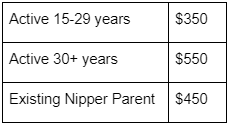Bronze Medallion
Our Summer course is at capacity. To register your interest in future courses, please complete this form.
This training program will take you on an 8-week journey towards becoming a patrolling lifesaver at Bronte Surf Life Saving Club and a valued member of the Bronte community.
On completion of all of the requirements, the program will provide you with:
Certificate II in Public Safety-Aquatic Rescue (PUA20119)
Complete First Aid Certificate (HLTAID011)
More information about course outcomes can be found on the SLSA website here.
Eligibility
To be considered for the course, you must attend a club-organised proficiency and swim 400m in a pool in under 8 minutes and 45 seconds (Or under 8 minutes and 30 seconds if wearing a wetsuit).
You will need to be swim and run fit, able to lift and carry rescue gear, boards, and adult patients in a team setting.
You will also need to be able to perform CPR and roll a patient on their side while kneeling on the ground.
You must be 15 years+ (Current cadets have a different Bronze medallion pathway. Please get in touch with Aaron at cadets@brontesurfclub.com.au).
You must intend to volunteer on a Bronte Surf Club Patrol Team for at least one season post-completion of the course.
If you're over 18, you must obtain a Working with Children Check.
Fees
The following fees include all training materials, training, and the patrol uniform for the Bronze Medallion award and First Aid certificate.

Please refer to our refund policy here.
What You'll Need to Provide
Wetsuit for wet skills training
Goggles & Swimmers
Water Bottle & Snacks
A computer for your e-learning modules
Etiquette
Attendance—Before considering this course, you must be available to attend all mandatory sessions. Due to the availability of volunteer training resources, there will be no catch-up sessions.
Teamwork—This course requires a great deal of teamwork and camaraderie. You must enter with that in mind and be prepared to support one another.
Respect—Due to the nature of rescue practices, many team scenarios require physical contact and proximity. Therefore, respecting one another and the club's facilities and rescue gear is essential.
Flexibility - As surf conditions are ever-changing and volunteers run this program, the location of training may change, or the training program may be altered depending on available resources.
We will always do our best to communicate changes in advance, but we appreciate your flexibility and ability to adapt.
Questions?
Please email Lydia at education@brontesurfclub.com.au
FAQs
Q: Does passing the swim proficiency mean you are guaranteed entry into the course?
No. The decision is based on several criteria. We consider the Club's current needs, including age, gender, nippers' involvement, and intention to patrol. For example, if we were to train only nipper parents, our patrol numbers would decrease in subsequent seasons. Therefore, we consider a range of factors to plan for future years.
Q: I'm afraid of sharks and can't swim in the sea. Can I still do the course?
No. You must be comfortable in the water and able to competently navigate surf and get out of trouble.
Q: What other training does the club provide?
After successfully gaining their Bronze Medallion, members can attain nationally recognised awards to increase their skills and confidence, including Inflatable Rescue Boat Crew/Driver, Silver Medallion Beach Management, or Aquatic Rescue.
Q: I don't want to be a lifesaver. Can I do the course just for fun?
We are a volunteer club providing lifesaving services to the community. All our trainers volunteer their time. Upon completion of training, you must become an Active Member to undertake regular beach patrols from September to April.
Rostered patrols occur approximately once every four weeks, on a Saturday or Sunday, and on 1-2 public holidays, totalling about 36 hours per season. You can request which day you prefer. If you are unable or unprepared to meet these minimum requirements, please do not enrol in this course.